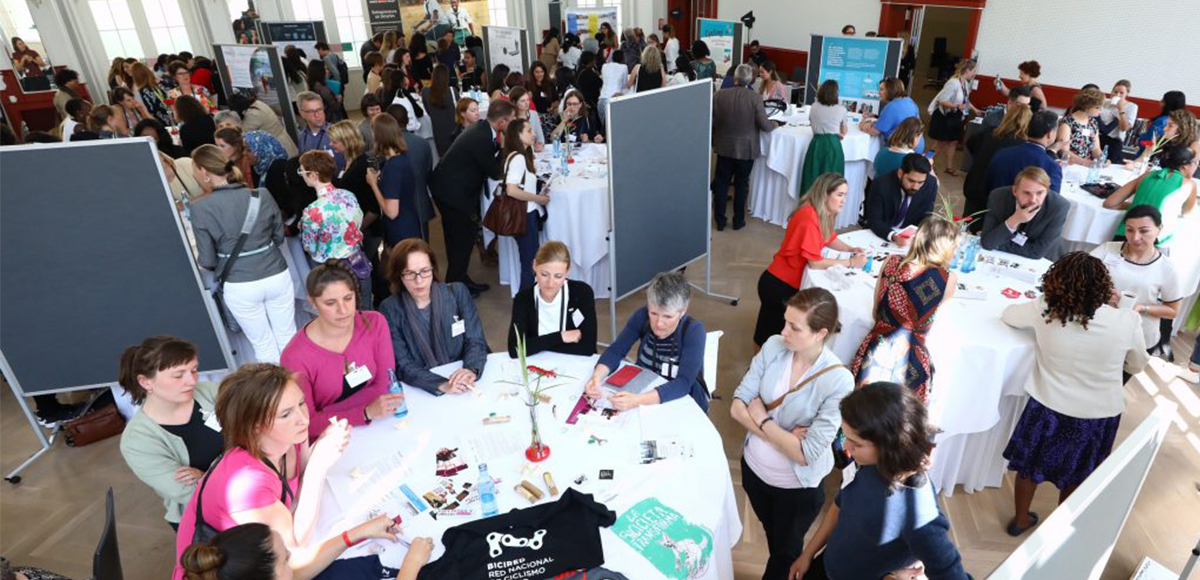The personal is the political, and personal experiences can become very powerful drivers of social action and change.
Across the world, women who are focussed on revolutionising the transport sector have found the right medium to be heard: the first ‘Women Mobilize Women’ Conference organised by the Transformative Urban Mobility Initiative (also known as TUMI). The conference was organised to empower women in the transport sector and change mobility systems to cater to women‘s needs.

The first Women Mobilize Women-Conference aims to connect female transport leaders and experts from around the globe
Source: womenmobilize.org
Held on 22nd May at Leipzig, Germany, the conference kick-started a conscious debate on the role and potential of women in the transport sector by involving female change-makers across the world to share their experience. In a male-dominated industry, the female-dominated conference on sustainable transport was a welcomed change.
Shreya Gadepalli, South Asia Program Lead (ITDP), and Sonal Shah, Senior Programme Manager (ITDP), were invited to moderate and speak at sessions respectively.

Shreya Gadepalli, South Asia Program Lead (ITDP), moderating at the event
The conference hosted an impressive diversity of speakers—female transport ministers, politicians, professionals and entrepreneurs from the Global South. While the group acknowledged that women are not a universal and homogenous group, they signified the need for diverse, personal experiences to bear the torch of revolution.




Through the exchange of experiences, one thing is certain, women across the world have more similarities than difference. Sharing of stories inspire people. Women should share their stories and learn from each other’s experience to make our cities, our world, more women-friendly.

The all-female speakers ranged from transport ministers and politicians to professionals and entrepreneurs
Integrating gender in transport is not only a technical issue but also a social one that will involve urban and transport planning, legislation and behaviour change. This requires broadening of expertise to include gender experts, sociologists, women’s groups, and social workers within planning teams.
ITDP has led work in India on Women in Transport by addressing the issues of safety, comfort, convenience and affordability of urban transport, in consultation with the people that mattered—women.
This work was presented during the session on ‘Innovative solutions and practical approaches for women empowerment and gender-sensitive urban transport – Exchange with the experts on the ground’. The presentation generated excitement from numerous participants on the role of indicators in setting goals for evaluating mobility plans, from a gender perspective. For example, measuring CO2 emission reductions from interventions can encourage women to use sustainable modes of transport.

Sonal Shah, Senior Programme Manager (ITDP), presenting on gender-intrinsic indicators for evaluating mobility plans
The concluding session on ‘Quick wins versus structural change’ unanimously agreed that no single organization will be able to achieve the goal gender equity in transport alone. Effecting structural change from pilot projects will require partnerships, bridges between social and technical expertise and sustained advocacy. However, the barriers in integrating gender in transport policies and implementation at scale still requires deeper introspection.
The experience has invigorated the ITDP India Programme on Women to continue full steam ahead: steering cities in India toward a women-friendly future makes for a brighter future indeed!
“A city for the Women, by the Women, and of the Women, is a city that’s great for all” — Shreya Gadepalli, ITDP.
ITDP invites you to share your urban transport story – write to us on india@itdp.org
Source of Cover Picture: http://womenmobilize.org/#program







